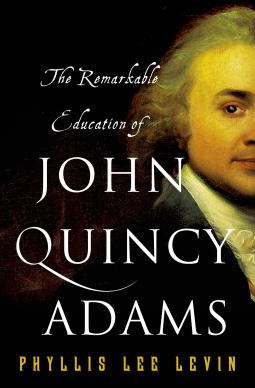I have studied John Quincy Adams backwards: from reading books about his parents, to his wife's biography, to his later career as a senator, to this book of his early life and career. It is not logical, but I am so glad it happened this way.
 The Remarkable Life of John Quincy Adams by Phyllis Lee Levin was made available to me through NetGalley; the book will be published in January 2015. I was familiar with the events and people. This book fleshed out the details but more importantly offered another view of John Quincy: a youth who suffered home sickness and depression while enduring long separations from his family; a teenager in the throes of first love; a young adult conflicted over career expectations; a man of passionate love but tied to parental expectations; a sentimental father whose wife miscarried five times and was devastated by the loss of an only daughter and suicide of a son. This is not the John Quincy that too many consider him to be: a dour, ram-rod straight, cold fish of a man.
The Remarkable Life of John Quincy Adams by Phyllis Lee Levin was made available to me through NetGalley; the book will be published in January 2015. I was familiar with the events and people. This book fleshed out the details but more importantly offered another view of John Quincy: a youth who suffered home sickness and depression while enduring long separations from his family; a teenager in the throes of first love; a young adult conflicted over career expectations; a man of passionate love but tied to parental expectations; a sentimental father whose wife miscarried five times and was devastated by the loss of an only daughter and suicide of a son. This is not the John Quincy that too many consider him to be: a dour, ram-rod straight, cold fish of a man.The photographs of John Quincy as a state elder embattled with Congress show a bald man with piercing unflinching eyes that are quite unsettling, communicating all the battles and disappointments of a lifetime. He looks straight at you, hands clenched, his beloved books beside him.
 |
 |
| John Quincy in 1796 by Copley |
Abigail wrote that her son was passionate and emotional. Years in the diplomatic core required complete control and repression of personal feelings. He asked his wife Louisa to use faith and philosophy to conquer the depressions and sorrows that afflicted her. It worked for him. But the extroverted, sensitive and romantic Louisa's frail physical health and tentative self-esteem buckled again and again. Her memoirs written late in life make John Quincy out as cold and dismissive. His own letters and diary speak volumes about his inner emotional life, and he was anything but cold. The lovers often misunderstood each other, but their love never faltered.
I already had an admiration for John Quincy's resolute and independent mind that kept The Constitution as it's lodestar and his parent's example as his role mode. Levin's book opened up John Quincy's humanity.
How many public servants today are willing to give up financial security, family, health, and even the good opinion of our colleagues to"duty" and our country? Our Founding Fathers like George Washington, John Adams, and John Quincy Adams had that kind of commitment.
Phyllis Lee Levin
St, Martin's Press
Publication: January 6, 2015
$35.00
ISBN: 9781137279620
No comments:
Post a Comment